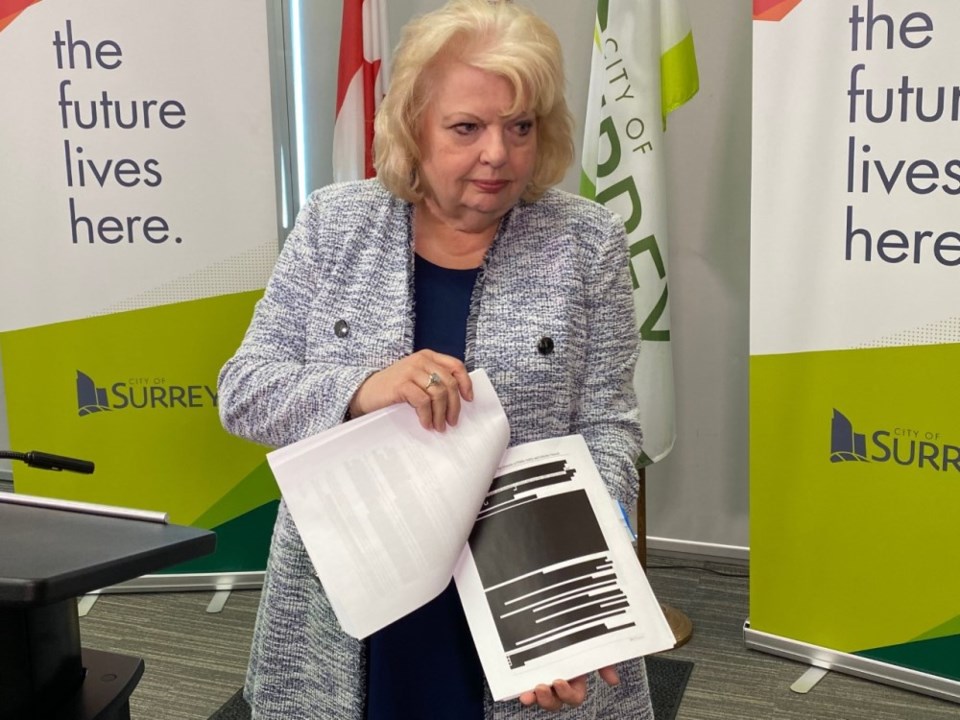If Surrey Mayor Brenda Locke has a number in mind for what it would take to end the provincial policing dispute, now would be a good time to resurrect it. Because despite the BC NDP government winning a technical victory in court last week, it’s clear New Democrats are still grasping for a real-world way to end this conflict before the October election.
Premier David Eby re-opened the door to negotiations with Locke on Monday.
“We're all just ready to move on,” he said. “And I hope that mayor and council are finally in a place where we can move on because Surrey is the fastest-growing city in British Columbia, probably the fastest-growing city in Canada, and we have to be working together.”
Eby and his ultra-powerful office, where power is consolidated, will likely be the mechanism for negotiations. Court documents tabled in the recent dispute show the premier took a hands-on approach to Locke, after she complained of personal animosity and a communications breakdown with Solicitor General Mike Farnworth.
Practically, there are no moves left for Locke or the city.
They could, technically, seek leave to appeal the BC Supreme Court decision last week. But it would be a stalling tactic, at best, because the ruling was crystal clear that the province had the power to pass legislation to force the city to continue its transition from the RCMP to the new Surrey Police Service.
The question left is around money.
The NDP have offered up to $250 million in aid on policing — but took $100 million of that off the table in early April after Surrey refused to accept the terms. Surrey says the true cost to cover its policing transition is upwards of $464 million over 10 years.
Officially, Eby said $150 million from the province remains available. “That money is still there,” he said on Monday.
Unofficially, the full $250 million is back in play too, given the premier’s cryptic answer to my question to him about that specific amount.
“The commitment that I can make to the people of Surrey is that we will ensure the taxpayers are protected,” he said.
“We will make sure that on the transition costs, the people in the city of Surrey are looked after.
“But how we do that, given the ongoing challenges that we have with the mayor of Surrey, and her continued desire to lengthen this conflict and stretch it out and make it worse instead of finding a path for a solid move forward, is that it's hard to say at this point.”
The difference between the province and Surrey is $214 million. That’s not nothing, but it’s also not financially devastating for a government running a $90-billion annual budget.
The NDP could, if it wanted, take the ground out from underneath Locke’s final position by simply changing the language of its last offer to say: $150 million now, and up to another $314 million over the next 10 years, if and when that money is proven necessary to prevent future police-related tax increases for Surrey residents.
The upfront amount would remain the same; only the 10-year guarantee would change.
Perhaps all that money won’t be needed, given the province has its own accounting of costs that indicated a lesser amount. And perhaps the NDP won’t even have to deal with Locke after the next municipal election in two years.
New Democrats, though, are worried that a capitulation to Locke’s figures might set a precedent and embolden other mayors to invent their own policing amounts in future disputes. That could become a more frequent problem if the RCMP begins transitioning out of contract policing.
It’s a fair point. But there’s also no other mayor whose city sits on 10 provincial ridings. The NDP wants to win those ridings in fewer than five months. To do so, the party may need to budge on its fear of setting a precedent.
The other route available for the province is to twist the screws on Locke and her council.
The government will likely need to impose a policing budget on the city, after council this month rejected the one proposed by government-appointed Surrey Police Board administrator Mike Serr.
The government could agree to the $141-million budget recommended by Serr and administer the bare bones financial aid package of $150 million itself.
But that would not stop Locke from spending the next four months running an opposition-style election campaign against New Democrats in Surrey, accusing every cabinet minister, MLA and candidate of being responsible for enormous increases in municipal taxes due to provincial stubbornness.
That’s ultimately what the BC NDP is trying to avoid. And there’s a path to avoid it. But to do it, New Democrats will have to plug their noses and help Locke save face by offering up more money. Otherwise, the fight continues.
Rob Shaw has spent more than 16 years covering B.C. politics, now reporting for CHEK News and writing for Glacier Media. He is the co-author of the national bestselling book A Matter of Confidence, host of the weekly podcast Political Capital, and a regular guest on CBC Radio.




